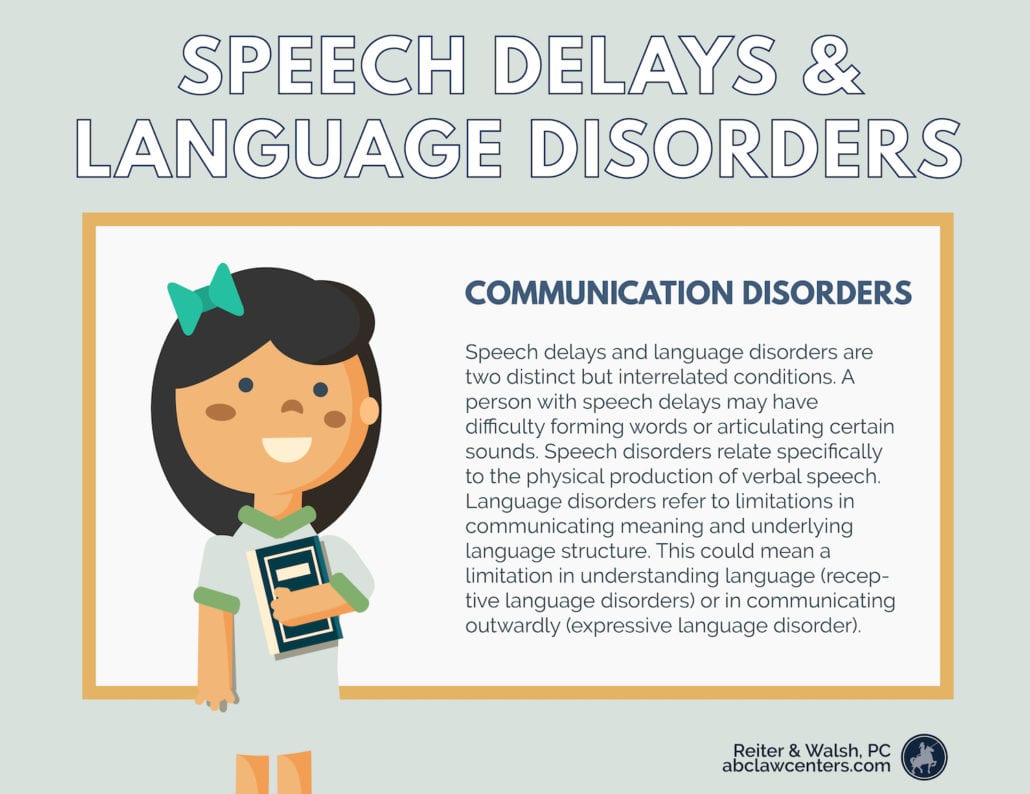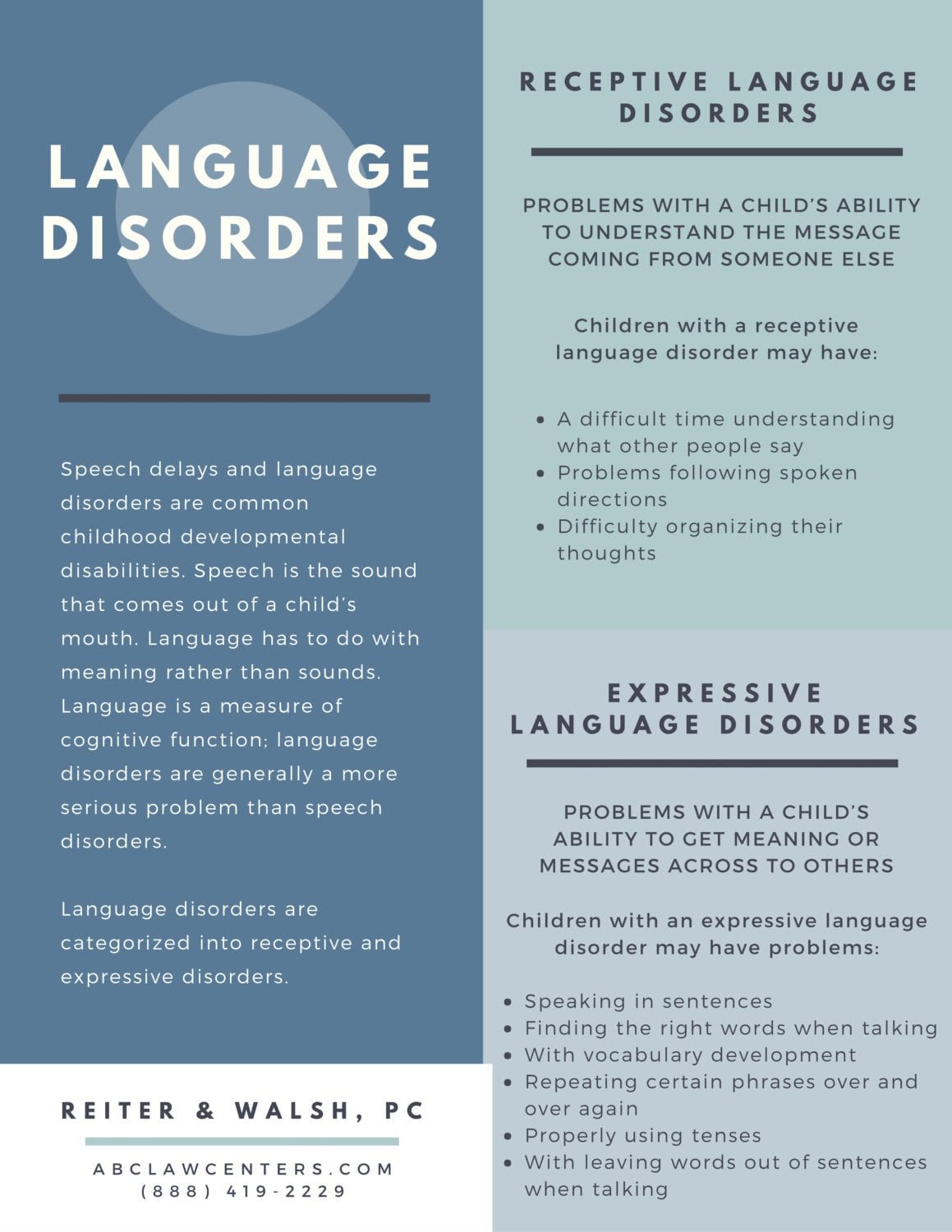Speech Delays and Language Disorders
What are speech delays and language disorders?
Speech delays and language disorders are two distinct but related conditions.
- Speech delays describe when a person may have difficulty forming words or articulating certain sounds (1).
- Speech disorders relate specifically to the act of speaking; the physical production of verbal speech.
- Language disorders refer to limitations in communicating meaning and underlying language structure. This could mean a limitation in understanding language (receptive language disorders) or in communicating outwardly (expressive language disorders).

What’s the difference between speech delays and language disorders?
Speech delays and developmental language disorders are the most common childhood developmental disabilities. The difference between the two stems from the difference between “speech” and “language.” Speech is the sound that comes out of a child’s mouth. If a child has a speech delay or disorder, they may have an oral impairment, such as a problem with the tongue or palate (1). They may also have a oral-motor problem, which means the difficulty they have in speaking lies in the areas of the brain responsible for speech. Finally, the issue could be auditory; many children have speech difficulties because they have trouble hearing. In these cases the child should see an audiologist.
Language has to do with meaning rather than just sounds (1).
Language disorders and delays refer to problems with:
- A child’s ability to get meaning or messages across to others. This is known as an expressive language disorder.
- A child’s ability to understand the message coming from someone else. This is known as a receptive language disorder.
A child can have an expressive language disorder, a receptive language disorder, or a mixed receptive-expressive language disorder.
Most children naturally develop language, starting at birth. The cognitive aspects of speech, being able to see, hear, understand, and remember, are crucial for language development. Children also need the physical ability to form speech.
Problems with receptive language skills usually begin before a child is four years old. Language disorders often occur in children with other developmental problems, autism spectrum disorder, hearing loss, and learning disabilities, and they are frequently caused by damage to the brain.

Signs and symptoms of language disorders
Children with language disorders typically have one, two, or more of the following signs and symptoms (2,3):
Signs and symptoms of receptive language disorders
Children with a receptive language disorder may have:
- A difficult time understanding what other people say
- Problems following directions
- Difficulty organizing their thoughts
Signs and symptoms of expressive language disorders
Children with an expressive language disorder have problems using language to express what they need or what they are thinking. These children may:
- Have a difficult time putting words together to create a sentence, or their sentences may be simple and short and the words may not be in order
- Have a hard time finding the right words when talking, and often use placeholder words such as “um”
- Have a vocabulary that is below the level of other children their age
- Repeat certain phrases over and over again, and repeat (echo) parts or all of questions
- Have improper use of tenses (past, present, future)
- Leave words out of sentences when talking
Treating speech delays and language disorders
Some speech issues can stem from hearing issues, so it is important to first rule out auditory challenges. If hearing is not the issue, parents should take their child to their pediatrician. Your pediatrician will evaluate and then refer the child to a speech-language pathologist if they feel it is necessary (3). An immediate referral for evaluation is always appropriate if parents suspect a speech or language disorder.
Early intervention
Early intervention is very important when a child has a speech or language problem. Speech-language therapy is the best approach, and children may need psychological therapy, including psychotherapy, counseling, cognitive therapy, and/or behavioral therapy due to the possibility of related emotional or behavioral problems.
Early treatment may prevent the frustration and/or behavioral problems that often occur when a child has problems communicating.
Speech delay/language disorders and disabilities: the link to birth injury
A number of underlying conditions, injuries, and disabilities can cause speech delays and language disorders. Birth injuries can cause damage to parts of the brain involved in producing, understanding, and synthesizing speech and language. Birth injuries that can cause brain injury and resultant speech and language disabilities include:
- Birth asphyxia, which occurs when the baby doesn’t get enough oxygen during or near the time of birth. Birth asphyxia can lead to a form of brain damage known as hypoxic-ischemic encephalopathy (HIE) and a variety of other birth injuries.
- Periventricular leukomalacia (PVL), which can also be caused by birth asphyxia. PVL involves damage to the brain’s white matter
- Brain bleeds (extracranial and intracranial hemorrhages) such as a subdural hemorrhage, subgaleal hemorrhage, and intraventricular hemorrhage (IVH)
- Infection, sepsis, and/or meningitis
- Herpes encephalitis
- Stroke
- Prolonged elevated bilirubin levels (prolonged and mismanaged jaundice that may lead to kernicterus)
- Neonatal hypoglycemia


Talking to a birth injury attorney about speech delays and language disorders
If you or a loved one had a difficult or traumatic birth, and your child now has speech delays or a language disorder, it may be worthwhile to have a birth injury attorney look over your medical records to see if medical malpractice played a role in your child’s disabilities.
Jesse Reiter and the team at ABC Law Centers: Birth Injury Lawyers have a primary focus on birth injury law, and nurses and experts available to assist in the cases that come through our doors. We’ve helped many families secure funds for their children’s future. Please feel free to reach out to us with any questions you may have. We don’t charge for any of the legal process unless we win!
Featured Videos
Posterior Position
Hypoxic-Ischemic Encephalopathy (HIE)

Featured Testimonial
What Our
Clients Say…
After the traumatic birth of my son, I was left confused, afraid, and seeking answers. We needed someone we could trust and depend on. ABC Law Centers: Birth Injury Lawyers was just that.
- Michael
Helpful resources
- Komisaruk, K. L. (Ed.). (2017, June). Delayed Speech or Language Development (for Parents). Retrieved March 2, 2019, from https://kidshealth.org/en/parents/not-talk.html
- Logsdon, A. (n.d.). What You Should Know About Receptive Language Disorders. Retrieved March 2, 2019, from https://www.verywellfamily.com/receptive-language-disorders-2162451
- Team, U. (n.d.). Expressive Language Issues: What You’re Seeing. Retrieved March 2, 2019, from https://www.understood.org/en/learning-attention-issues/child-learning-disabilities/communication-disorders/expressive-language-issues-what-youre-seeing


